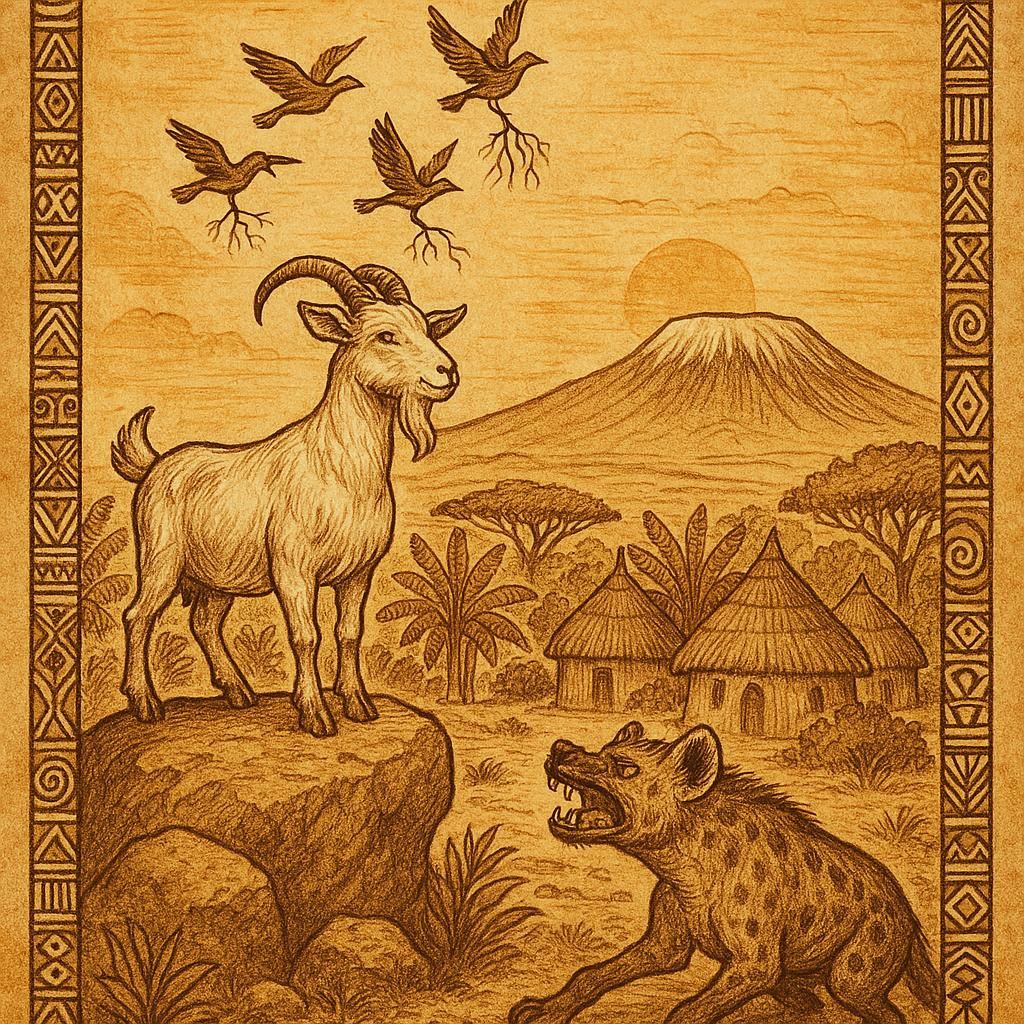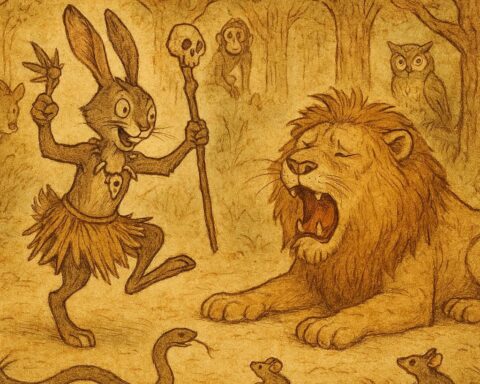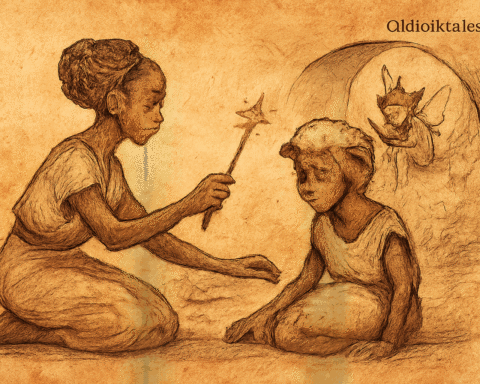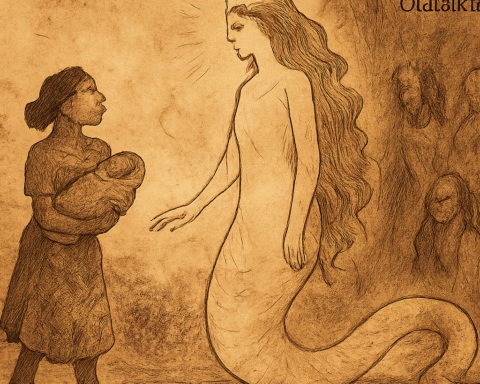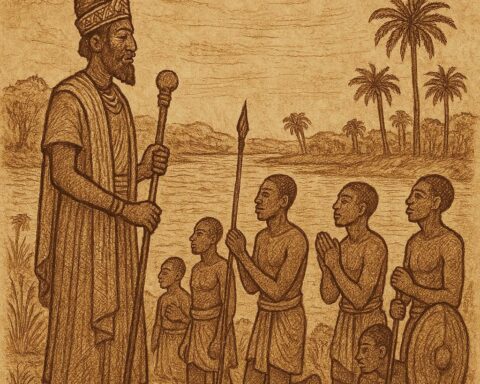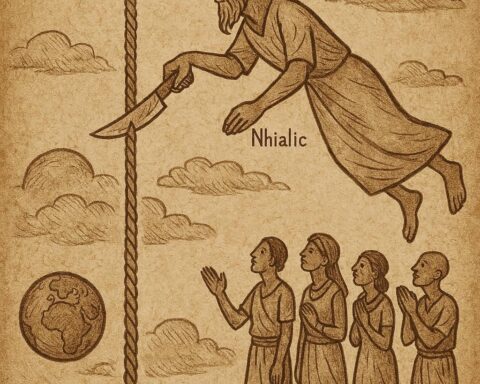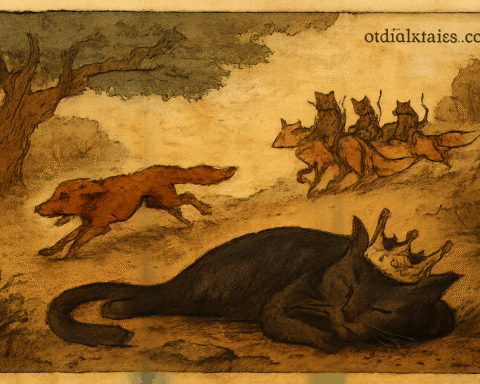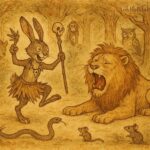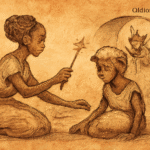Come closer, little ones, and listen, for the night wind carries the old voices of our ancestors. This is a tale from the Chaga people, who live where the clouds rest on the shoulders of mighty Kilimanjaro, where the soil is rich and the bananas and beans grow in wide groves. The story is about a goat, humble yet wise, and a hyena, greedy and blind to wisdom.
Long ago, when animals still spoke as we do, there was a small goat who lived near the homestead of a Chaga family. His coat was white as milk, his horns curved like the crescent moon, and his mind was sharper than the knife of a herdsman. Each day, he grazed near the banana groves, leaping lightly between stones, never straying too far from the safety of the huts.
But lurking in the forest’s edge was Hyena. His belly was always growling, though he had eaten only hours before. His teeth were yellow and crooked, and his eyes glowed with hunger. He looked at Goat and thought, “Ah, there is my feast. Tender, fat, and foolish!”
One evening, as the sun painted Kilimanjaro red and gold, Hyena approached Goat with a sly grin.
“Brother Goat,” he said, licking his lips, “let us be friends. Why do you graze alone? Come, let us share the fields. We will find food together, and I will protect you from danger.”
But Goat, wise as the elders, knew the nature of Hyena. He bowed his head politely and answered, “Friendship is good, Hyena, but true friends do not eat one another. Still, let us test our luck together. Tomorrow we shall dig up roots in the valley, and we will see who gathers more.”
Hyena agreed, though in his heart he thought only of Goat’s flesh.
The next morning, Goat led Hyena down to the valley where the soil was soft. They began to dig. Goat dug quickly and cleverly, unearthing sweet roots and piling them neatly. Hyena, greedy and impatient, dug roughly, breaking most of the roots and eating half before they reached his pile. By midday, Goat had a tall heap of roots, while Hyena’s pile was small and messy.
Ashamed, Hyena tried to hide his failure. “Goat,” he said, “why don’t we rest? Let us roast the roots by the fire, and eat them while they are warm.”
Goat nodded, but he had a plan. As Hyena prepared the fire, Goat slipped away and called upon the birds of the forest. The weaverbirds chirped, the hornbill cried, and together they carried some of Goat’s roots high into the trees. When Hyena turned back, Goat clapped his hooves and shouted, “Look, Hyena! Even the birds rejoice at my harvest, carrying it to the heavens.”
Hyena’s mouth dropped open. Greed boiled in his belly. He leapt and leapt, snapping his teeth at the birds, but they were far above. The more he jumped, the hungrier he grew. At last, exhausted and empty-handed, he collapsed on the ground.
Goat laughed softly, not in cruelty, but in wisdom. “Hyena, your greed blinds you. You eat before you gather, you demand before you share, and so you end with nothing. Even the birds carry away what is not respected.”
But Hyena was too angry to listen. His hunger sharpened again, and he thought, “If I cannot have the roots, I shall have Goat instead!” He lunged forward with a growl.
Quick as lightning, Goat darted between the rocks and into the banana grove. He weaved left and right, his hooves clattering like drums. Hyena chased, but he stumbled on the stones, his heavy body no match for Goat’s nimble leaps. Soon, Hyena crashed into a fallen log, bruising his snout. Goat bounded onto a high rock, out of reach, and cried:
“Greed will always trip you, Hyena. Wit will always outrun teeth.”
The villagers, hearing the noise, came with spears and sticks. They chased Hyena back to the dark forest, where he limped away, nursing both his hunger and his shame. Goat returned to the homestead, welcomed with laughter and banana beer, his cleverness sung in song.
And from that day, children, Hyena was never trusted in the open fields. His belly growled on, but no animal would share with him, for he had proven that greed makes even the strongest weak, while cleverness keeps even the small ones safe.
Moral of the Story
The tale of the Clever Goat and the Greedy Hyena teaches us that greed devours itself. Those who think only of their stomachs lose even what little they have. But wisdom, patience, and cleverness protect the humble and multiply blessings. On the slopes of Kilimanjaro, the Chaga people say: “A wise goat will live longer than a greedy lion.”
Knowledge Check
- Which two animals are the main characters in this Chaga folktale?
The clever Goat and the greedy Hyena. - Where is this folktale from?
From the Chaga people of northern Tanzania, on Mount Kilimanjaro. - What challenge did Goat suggest to Hyena?
A contest to see who could dig up more roots in the valley. - Why did Hyena end up with fewer roots than Goat?
Because he was greedy, broke many roots, and ate before gathering. - How did Goat outsmart Hyena with the help of the birds?
He had birds carry some of his roots into the trees, making Hyena envious and distracted. - What is the moral lesson of the folktale?
Greed blinds and weakens, while wisdom and cleverness protect and sustain.
Source: Based on oral traditions of the Chaga people of Tanzania
